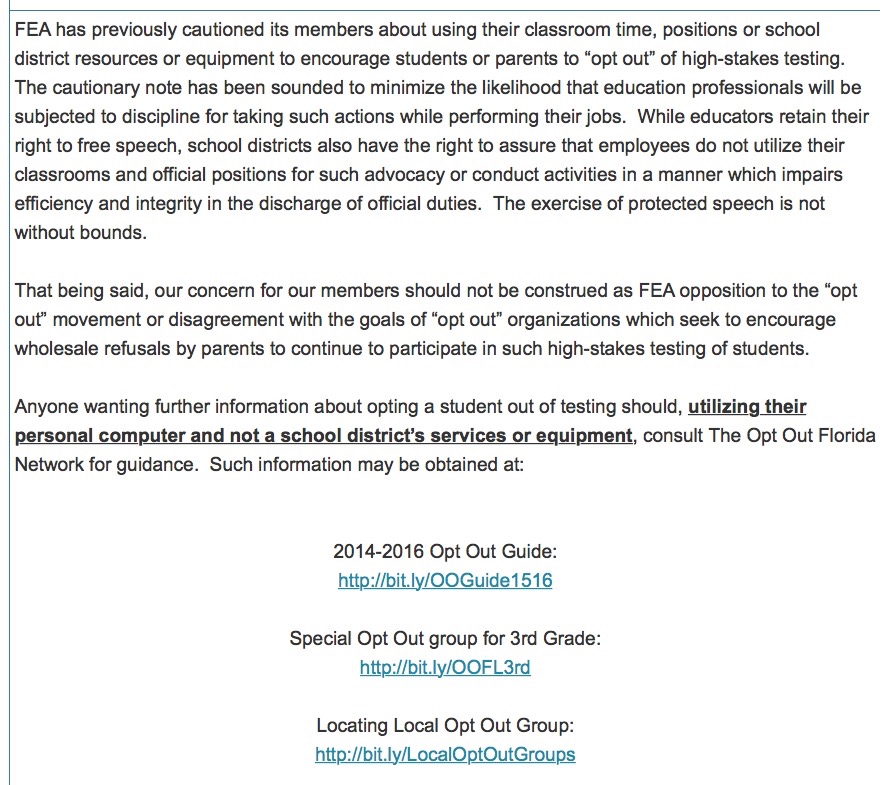Fcat 2017 11th Grade Guide
It's standardized-testing season in Florida's public schools, which means that parents, grandparents, students, teachers, administrators, and classroom goldfish are probably in a bad mood. Every March and April, public school students grades 3-11 must take take a test — this year, it is the, which is the newish incarnation of the FCAT. It claims to measure how much students have learned every year. But critics say the tests stretch far too long, are confusing, and don't adequately measure anyone's progress. So in the past few years, antitesting advocates have told their kids to 'opt out.' They say that skipping state-mandated tests in an act of civil disobedience.
According to state law, 'Participation in the assessment program is mandatory for all school districts and all students attending public schools, including adult students seeking a standard high school diploma under s. 1003.4282 and students in Department of Juvenile Justice education programs, except as otherwise provided by law.
If a student does not participate in the assessment program, the school district must notify the student’s parent and provide the parent with information regarding the implications of such nonparticipation.' This month, when individual school districts asked for guidance on how to handle opt-outers, Pam Stewart, Florida's education commissioner Stewart referred to that law and noted it 'states clearly that participation is mandatory for all districts and all students attending public schools. My belief is that students who do not want to test should not be sitting in public schools, as it is mandatory and required for students seeking a standard high school diploma. Study world history. Statewide, standardized assessments are part of the requirement to attend school, like immunization records.
Florida School Grades 2017
That is our message and what we send to you to be shared with your staff.' In January, Stewart that state law has 'no opt out clause or process for students to opt out or for parents to opt their children out.” She said that the only allowable reason for opting out is a medical excuse. But anti-testing advocates claim Stewart is just pushing the tests to buddy up to the testing provider, a private company: Pearson Assessments. 'It's morally corrupt to give these tests,' one advocate who works within Broward's school system said. The person declined to be named, out of fear of being fired. 'They're selling this narrative that the tests are a good way to determine which teachers are good at teaching.
The problem is, to put it bluntly, that they're really utilizing our kids to make a profit for the test-makers.' When New Times asked Broward Public Schools about for its policies and consequences for families that choose to opt out, a spokesperson told us, 'No single assessment is the sole determiner of promotion' but 'the state does not provide a process/option for 'opting out' of the FSA.' Anti-testing advocates say that there are loopholes that let families get around taking the tests. Retired Broward teacher and FSA critic Dr. Trudy Jermanovich, who taught middle-school science in Broward for more than two decades, explained: 1. Make sure the decision is right for you. 'What I tell parents to do is first make a commitment as a family that they want to do this,' says Jermanovich.

She warned that school administrators may threaten to hold children back or send them to summer school for skipping the FSA. But if you know your rights, she says, you can fight back fairly easily, she says.

'You're not only doing this for your own children but for other children going through the process,' she says. 'You're making a statement. So much time is sucked out of the classrooms not just for the test but also for test prep.'
Notify your school. Once you've decided to opt out, contact your child's school administrators and tell them you've chosen to do so. (Doing this before the test begins is optional but probably in your best interest.) It's good to explain your position in writing, Jermanovich says. This is especially important in both the third and tenth grades, which the school district considers 'retention years.'
In third grade, the student is typically required to pass the Language Arts portion of the FSA to pass on to fourth grade — and a tenth-grader must pass to continue as well. Broward School Board policy lists 'promotion criteria for each grade level. While passing the FSA is one such way of earning promotion, there are also other ways for each grade level.
( For third graders, Jermanovich suggests informing the administration you want a 'portfolio assessment' done. This means a student will be judged on his or her schoolwork, rather than a series of state-mandated tests. 'It can be collected in a folder or done on the computer,' Jermanovich says.
'It just proves they can do the schoolwork. It's what teachers used to do anyway, so it shouldn’t be a hard task.' If a tenth-grader skips a test, he or she can also substitute his or her SAT or ACT scores instead. Figure out your test-day plan. When testing actually starts, you basically have three options. Most obviously, you can keep your child home on test day and then on the subsequent makeup days your child is assigned.
You can also send your kid into school and pick him or her up early, right before testing begins. But, antitest advocates point out, this is particularly difficult for working parents, who can't just skip weeks of work every March. If your child has to attend school, he or she will typically be forced to sit through the test that day.
The test packets themselves are sealed shut. Antitesting advocates say that if your child breaks the test open but does not answer questions, the test will be scored as 'incomplete'rather than 'failing.' This is, as explained in a guide put out by the Florida Department of Education. (Children who must take computer tests can also hit 'finish test' without answering any questions, Jarmanovich suggests. 'What you're doing is 'minimally participating',' Jermanovich says.
Antitesting advocates believe that if enough students minimally participate, Florida schools will place less weight on standardized testing, or do away with the process altogether. They key to ensuring your kid continues to pass through the school system, advocates say, is persistence. On social media, parents say they've received wildly different responses to 'opting out' depending on the schools their children attend. Some parents have said that teachers were supportive, and others have said their children got threatened with failing or sent home.
The purpose of the practice tests is for students to become familiar with the CBT system, functionality, and item types; the practice tests are not intended to guide classroom instruction. Descriptions and response instructions for each item type are included in the Practice Tests Guide. Users should refer to the tutorials on each item or the guide to familiarize themselves with the different features and response instructions for each item type.

Please see the list on the right of this page for the availability of practice tests. Scripts for computer-based practice tests are available under FSA Resources. Practice test scripts are not provided for paper-based assessments as practice tests are not required for paper-based assessments. Answer keys for English Language Arts (ELA) Reading and Mathematics practice tests that list the item, correct answer, and grade level/subject of each item are also available for each published training/practice test.
ELA Writing rubrics are available under the FSA Resources section. Computer-based practice tests are designed for use with the Secure Browser or a supported web browser.
The supported web browsers for the practice tests are Firefox 52–54, Chrome 60–65, Safari 7–11, Internet Explorer 11, or Edge. Use of an updated browser (i.e., a newer version of the listed browsers) may result in some features of the practice tests not functioning correctly. Browsers not listed here (e.g., Opera) will not work with the practice tests.